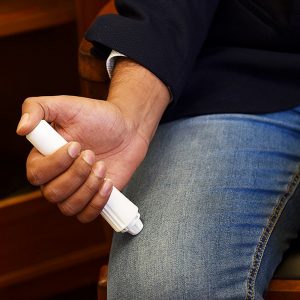Auto-injector is a needle based medical device which is used for the administration of a fixed dose of a particular drug. It can be used for self-administration by the patients or untrained person, as it is easy to handle. Furthermore, auto-injector is significantly used for various mild and severe allergic reactions. If allergic reaction are not cured, then it can even lead to life-threatening condition such as anaphylaxis. Allergy symptoms include trouble in breathing, wheezing, nausea, stomach pain, vomiting, dizziness, faint, swelling of face, mouth, lips, and tongue and skin reactions such as itching, hives, and flushing. Moreover, site of administration depends on the nature of the drug. For instance, insulin shots are always injected in the abdomen site to make them work fast. However, a long term allergy effect caused by food, dust, pollen, and many more substances can lead to life-threatening crisis, which is expected to fuel growth of the auto-injectors market.
Get PDF Research Brochure for more Professional and Technical Insights: https://www.coherentmarketinsights.com/insight/request-pdf/1035
Advancement of auto-injector devices to provide more access to the patients is expected to drive growth of the market
In 2017, Kaleo Pharmaceutical announced supplemental new drug application (sNDA) named as – AUVI-Q (0.1mg), which was granted a priority review by the U.S. Food and Drug Administration (US FDA). AUVI-Q is the first known epinephrine auto-injector, which is designed to treat an allergic reactions especially in infants, weighing around 16.6 to 33 pounds. According to the study by Allergy, Asthma & Clinical Immunology, children’s treated with anaphylaxis has limit of around 0.15 mg per auto-injector, which should have 12.7mm needle length and mainly used for patients with high-risk. The high dose of drug use in life-threatening condition, could strike the bone during the administration of epinephrine. Moreover, National Institute of Health (NIH) guidelines recommended AUVI-Q 0.1 mg for peanut allergy, as it contains no epinephrine auto-injector (EAI). Thus, AUVI-Q 0.1mg is mainly designed to minimize complications during treatment of pediatric patients. Furthermore, Kaleo pharmaceutical announced new program called – Q Your School in 2017, this program will provide free AUVI-Q epinephrine auto injector devices to over 67,000 public elementary schools in U.S. AUVI-Q has new advance features such as voice-activated prompts that will give precise guidelines. Thus, it is expected to propel growth of the auto-injectors market.
Ask for TOC : https://www.coherentmarketinsights.com/ongoing-insight/toc/1035
Global Auto-injectors Market Taxonomy –
By Product Type–
- Fillable Auto-injector
- Prefilled Auto-injector
By Technology –
- Automated Auto-injector
- Manual Auto-injector
By Usability –
- Reusable Auto-injector
- Disposable Auto-injector
By Design –
- Customized Auto-injector
- Standardized Auto-injector
By Application –
- Anaphylaxis
- Rheumatoid Arthritis
- Diabetes
- Others (multiple sclerosis)
By Distribution Channel –
- Hospitals
- Pharmacy
Request for Discount Before Buying This Business Reports @ https://www.coherentmarketinsights.com/insight/request-discount/1035
About Coherent Market Insights:
Coherent Market Insights is a prominent market research and consulting firm offering action-ready syndicated research reports, custom market analysis, consulting services, and competitive analysis through various recommendations related to emerging market trends, technologies, and potential absolute dollar opportunity.
Contact Us:
Mr. Shah
Coherent Market Insights
1001 4th Ave, #3200
Seattle, WA 98154
Tel: +1–206–701–6702
Email: sales@coherentmarketinsights.com

